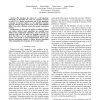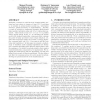22 search results - page 4 / 5 » Optimal Implementation of the Weakest Failure Detector for S... |
WDAG
1997
Springer
13 years 9 months ago
1997
Springer
Abstract. We study the problem of achieving reliable communication with quiescent algorithms (i.e., algorithms that eventually stop sending messages) in asynchronous systems with p...
JSA
2008
13 years 5 months ago
2008
Nowadays, there are many protocols able to cope with process crashes, but, unfortunately, a process crash represents only a particular faulty behavior. Handling tougher failures (...
SRDS
2010
IEEE
13 years 3 months ago
2010
IEEE
We introduce the notion of a swift algorithm. Informally, an algorithm that solves the repeated consensus is swift if, in a partial synchronous run of this algorithm, eventually no...
PRDC
2007
IEEE
13 years 11 months ago
2007
IEEE
Consensus is one of the most fundamental problems in fault-tolerant distributed computing. This paper proposes a mechanical method for analyzing the condition that allows one to s...
SAC
2010
ACM
14 years 10 days ago
2010
ACM
Byzantine consensus in asynchronous message-passing systems has been shown to require at least 3f + 1 processes to be solvable in several system models (e.g., with failure detecto...


